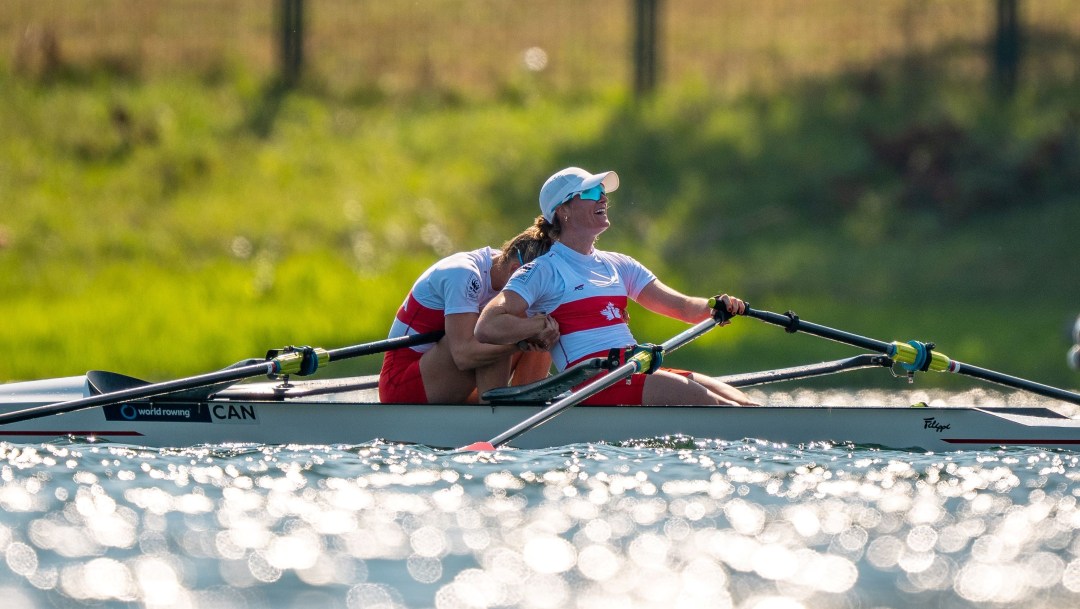The last of the lightweights: Jill Moffatt and Jenny Casson set to close a chapter in Canadian Olympic rowing history this summer
Everyone knows that teammate relationships are special.
In team sports, there’s the need to be cohesive, to communicate, to fit together like different pieces of the same puzzle. Even athletes who regularly compete solo, such as Team Canada’s swimmers, have often remarked on the joy of competing in relays, when the pressure of performance can be shouldered across four people instead of one.
But there’s maybe something even deeper when it comes to duos–those two-person partnerships that exist in the in-between state of individual and large team sports. No, you’re not alone–but you’re also the only one your teammate can count on. There’s a weightiness to that responsibility of holding another person’s dreams in your hands, and handing them your own.
So how do you do it well?
In talking to Team Canada lightweight double sculls rowing duo Jenny Casson and Jill Moffatt, it’s hard to imagine a pair of athletes more deeply invested in each other’s performance, but also each other’s happiness. While chatting with us, the two frequently finished each other’s sentences, cracked up at each other’s jokes, but also emanated a deep respect for one another as individuals.
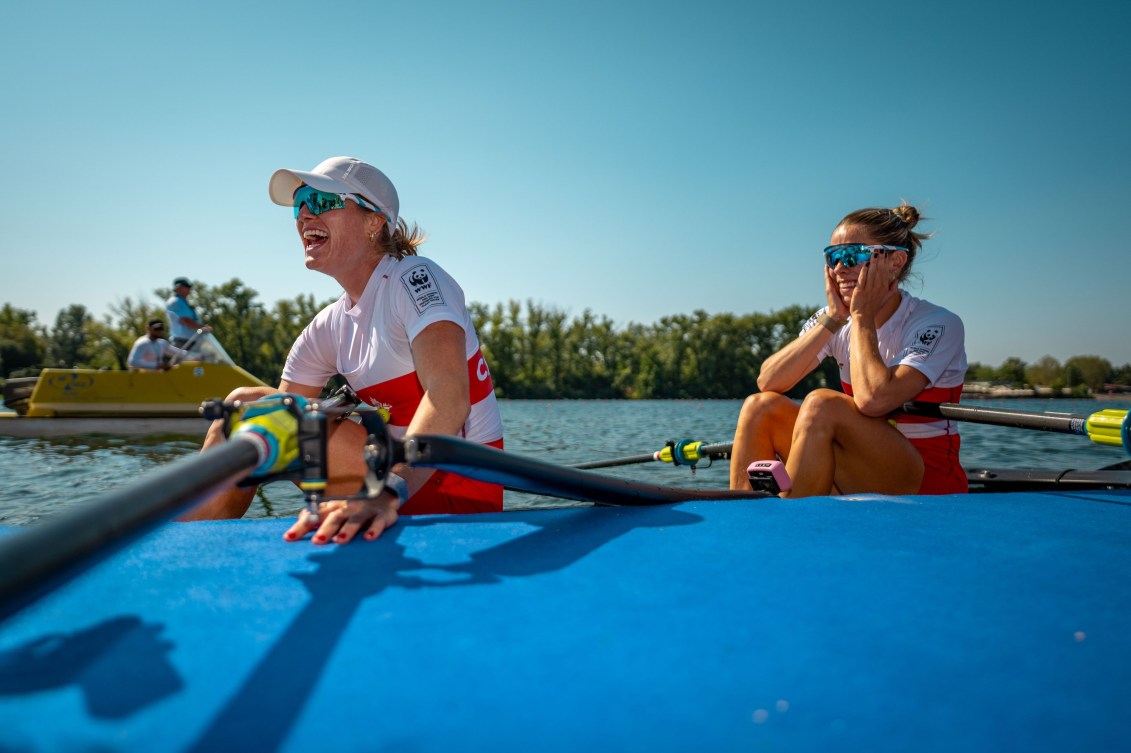
How do they describe being a duo?
“It’s when you find someone that can bring out the best of you without putting down the worst of you,” says Casson.
“For us, it’s kind of like a marriage,” Moffatt adds. “There are massive ups and massive downs. But one thing that’s always unified us is that we have similar values.”
Some of those values include perseverance, hard work, and respect. But unlike a marriage, in rowing, you don’t get to pick your partner. Rather, you get selected to be in a boat together and need to figure out how to make it work.
Building the foundation
Moffatt and Casson first raced together on and off starting in 2018. Their paths into the sport looked quite different. Casson took up rowing in high school in Kingston, Ontario after a running injury sidelined her from her first sporting love. Moffatt, on the other hand, didn’t pick up an oar until her first year of university, where she joined the novice team at Western for fun, knowing little about the sport.
But that’s one of the things that Moffatt says is perhaps a bit magical about rowing. Unlike in sports like, say, diving or figure skating, where when you master a skill you level up to a harder one, rowers are always trying to perfect the same thing, no matter their level.
“It’s the same stroke, the same idea of not wanting to disrupt the water with your blades,” Moffatt explains. “It just becomes about reducing the margins, but it’s never perfect. We’ve worked on the same thing for 15 years. You’re just trying to get closer to perfect, even though perfect doesn’t exist.”

Each of them fell in love with that pursuit of the elusive perfect stroke, the closeness of their rowing communities, and the bonds formed through early morning practices and gruelling workouts. Eventually, their rowing worlds collided and they started being paired together.
“I always looked forward to rowing with Jenny because I always knew that she was going to try her hardest, even if it meant putting herself out there and failing. I knew she would push me and expect that of me,” Moffatt explains.
“Jill is always the hardest worker in the room, no matter where you go,” Casson counters.
“She’s also always been the positive one. Not in an annoying, fake way, but in a realistic way. She’s the one who says ‘we can do this, we can get through this, we can get better,’” Casson says.
But Casson is also a rock for Moffatt, who bravely opened up in a personal essay for Olympic.ca in January about her experience with anxiety and panic attacks throughout her elite rowing career. A passage in that essay about Jenny’s role in helping Jill manage her mental health stands out as a fitting representation of their commitment to each other:
Jenny has been there to hold my hand as a panic attack has taken hold of me. She’s been there to tell me it’s okay and we can take whatever time I need. She’s never judged me, she’s never made me feel as if I am letting her down. In a sense I feel indebted to her for her compassion and trust. Because of my panic attacks, our bond has grown in ways that you can’t force. Because of the compassion she’s shown me, I will do anything to make sure her dreams come true.
In a duo, you hold each other’s dreams in your hands. If their hands shake, you hold them steady.
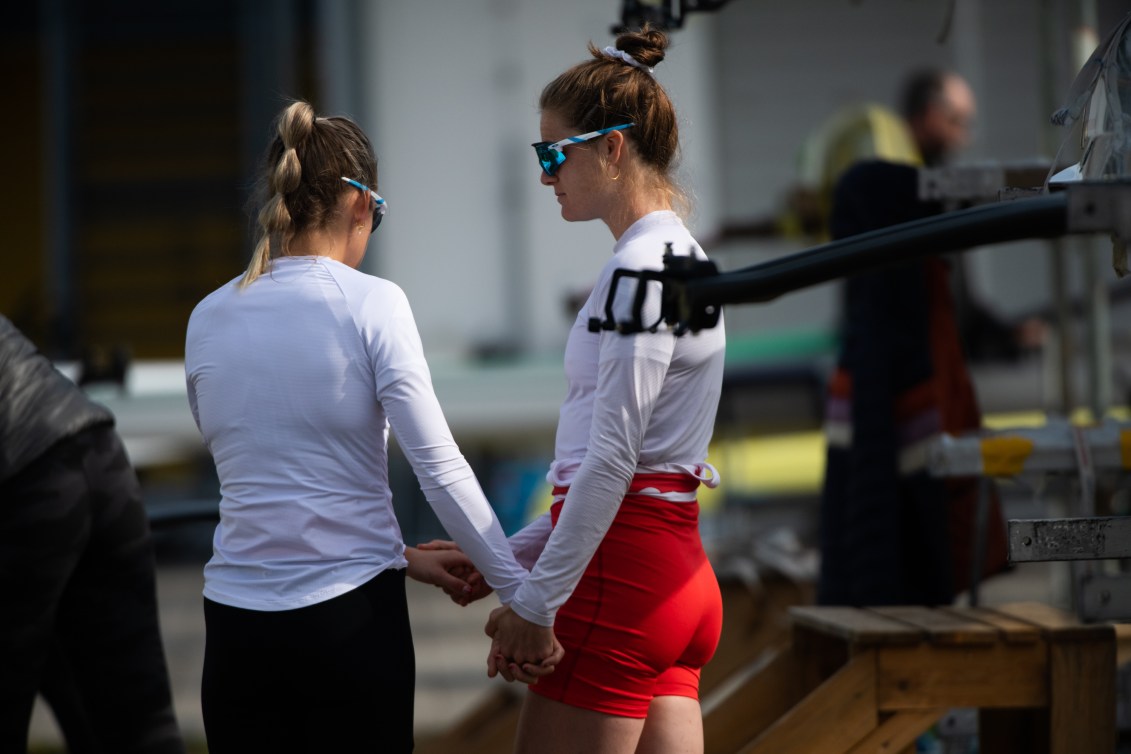
Succeed together, fail together
Tokyo 2020 didn’t go the way that Moffatt and Casson dreamed. Despite it being their first Olympics, both of them had goals much greater than their 12th place finish. And they want to prove what’s possible at Paris 2024.
Moffatt and Casson secured the quota spots for Canada when they advanced to the A final at the World Rowing Championships in Belgrade, Serbia in September 2023. They placed fourth in the women’s lightweight double sculls, their highest finish at the world championships as a team. While they have not yet been officially named to the Canadian Olympic Team, they are the only lightweight crew competing for Canada on the World Cup circuit this season.
The duo finished fifth at the first World Rowing Cup in April in Varese, Italy. The next World Cup will take place May 24-26 in Lucerne, Switzerland. This offers them the opportunity to get much more racing in ahead of the Games than they were able to before Tokyo, due to COVID-19 travel restrictions and risks, which is a confidence booster in terms of getting to the start line feeling prepared.
READ: A tale of two eights: Team Canada rowers on staying in sync, Olympic legacy, and fun
Part of that preparation is honing their unspoken communication skills. While larger boats, like the eights, will have a coxswain to steer and give instructions to the crew, Moffatt and Casson have to rely on race plans, instinct, and peripheral vision to make those decisions. Rowers have to monitor their competitors and their teammate, all while keeping the boat as steady as possible.
“You’re reading in your peripheral vision, but also in your understanding of who is probably doing what based on their history,” Casson explains.
But with synchronicity being the name of the game, one team member can’t just decide to react to a move by opponents and pick up the pace.
“You can’t go without them, and they can’t go without you. If that happens, it’s game over,” she adds.
Seems like a metaphor for duo sports.
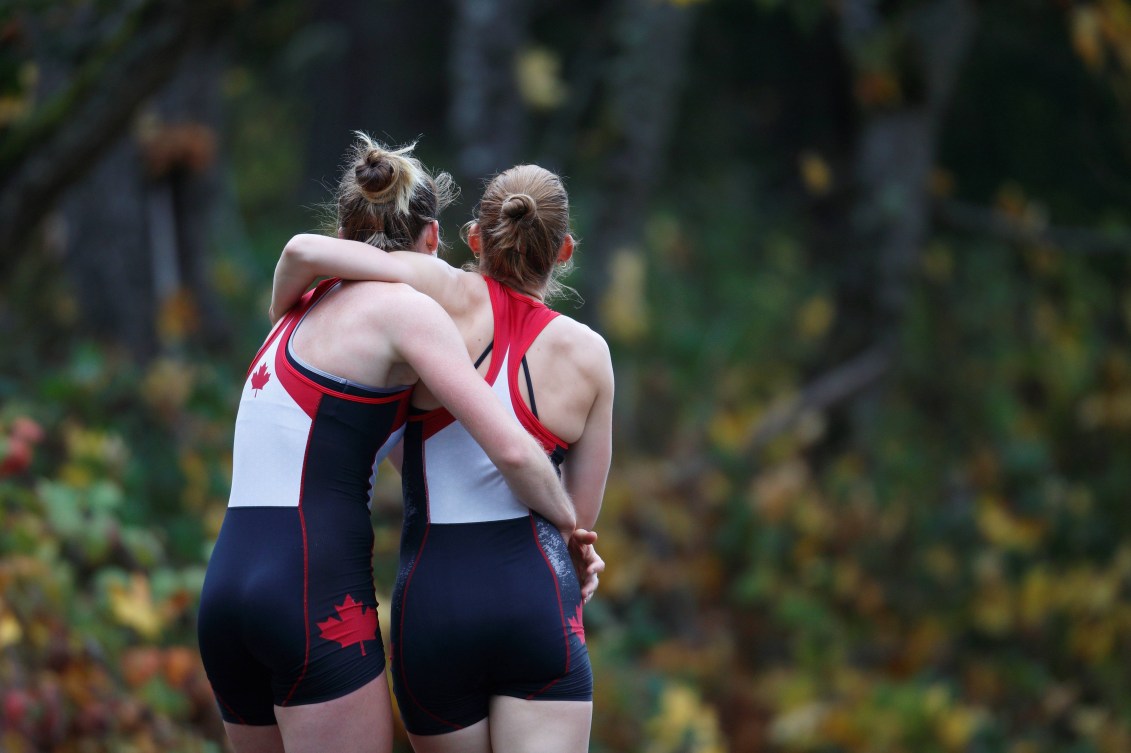
The last Olympic lightweight partnership
Paris 2024 is the last Olympic Games that will feature lightweight rowing events on the programme.
The decision comes as the IOC seeks to limit weight class sports outside of combat sports, with athlete health in mind. With the removal of lightweight rowing, beach sprints, from the discipline of coastal rowing, will be added to the Olympic programme at LA 2028.
For Moffatt and Casson, that news was at first met with relief–the murmurs in their community had been that Tokyo 2020 would be the final Olympic run for lightweight rowing. But COVID-19 came and knocked the world off schedule, and suddenly Tokyo wasn’t the last dance for the discipline.
“For us, a little bit, this feels like a bonus. Three years ago we weren’t going to have this chance,” Moffatt says. She had been starting to form retirement plans, and this way, the end date was chosen for her. Off the water, Moffatt has teamed up with fellow Olympians Melissa Bishop-Nriagu, Mandy Bujold, Kim Gaucher, and Paralympian Erica Gavel, to develop a project called MOMentum, which advocates for family planning resources and support for parents involved in elite sport.
While Moffatt and Casson are accepting of the decision to remove lightweight rowing, and are even pleased with how the timeline worked out for their own careers, they have thoughtful and nuanced perspectives on the removal of the category from the Olympic Games.
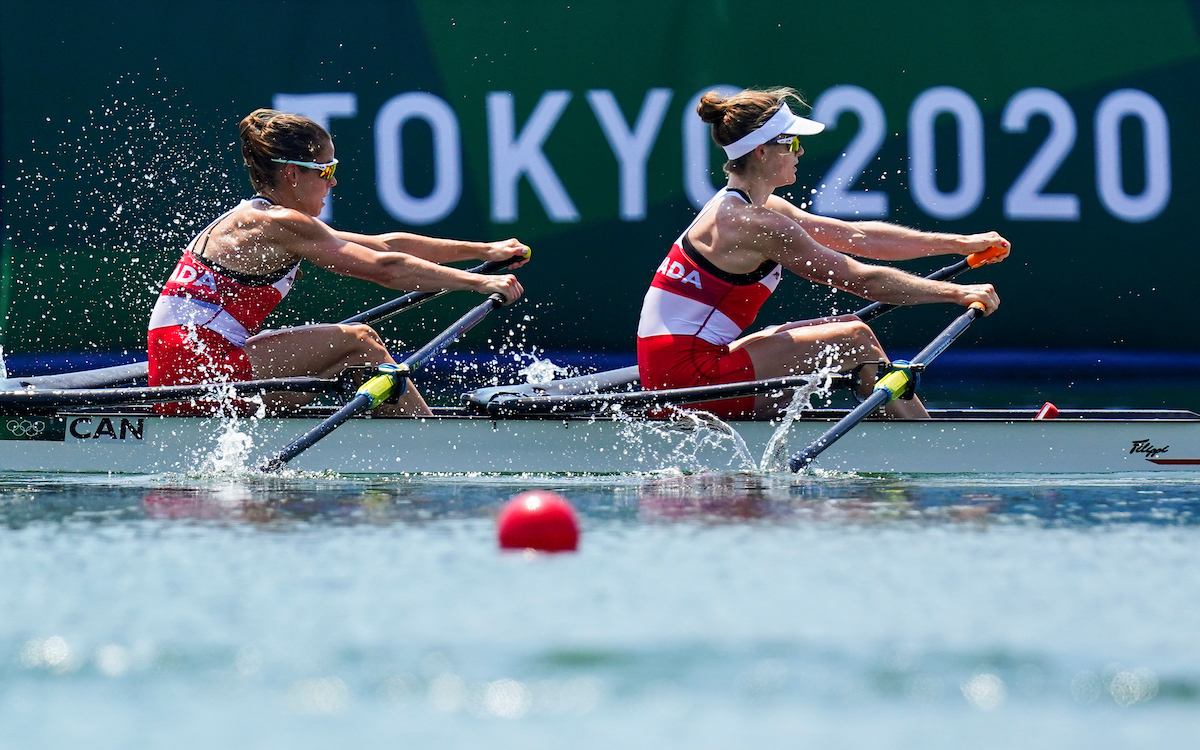
“I think it’s a huge loss for the sport. One hundred percent,” Moffatt says. “It’s obviously about participation and the numbers and the pressure to decrease the size of teams. I think there’s more creative ways that rowing can be really innovative, but that’s above our pay grade and Rowing Canada’s pay grade.”
Casson agrees. “It’s brutal to see because we know how tight our margin is, and we know what kind of athletic individual lightweight rowers are. We all weigh in two hours ahead of time. We all train a thousand different ways. But at the end of the day, we are the most evenly matched competition and there’s one event. So for us the stakes are high. To lose that intensity at the Olympic Games is a shame.”
That being said, Casson acknowledges that there are positive reasons behind cutting events as the Olympic programme generally broadens, and recognizes there is merit to concerns about weigh-ins if athlete health is not the number one priority of a program.
“Growing the Olympics into a wider network of sport, of accessibility, of new ways of human excellence is awesome. I think we should always be evolving to include more,” she says. “And there’s part of me that doesn’t love a lot that comes with being a lightweight–having to weigh in and having seen what can happen and the risk to health and with eating disorders if not done properly.”
There’s a Canadian legacy in the women’s lightweight double sculls, with Tracy Cameron and Melanie Kok winning bronze at Beijing 2008, and Lindsay Jennerich and Patricia Obee taking silver at Rio 2016. All that’s missing is that gold medal.
Moffatt and Casson want to be the ones to snag that final medal. But, as Moffatt points out, so does everyone.
“All the women we are competing against know that this is their last Olympics, it’s their last time for their country. So there is this air of excitement and almost desperation and drive to be the ones who win–because you’ll be the last ones who ever do it.”
It’s a heavy dream. One that’s best shared across two sets of hands.

